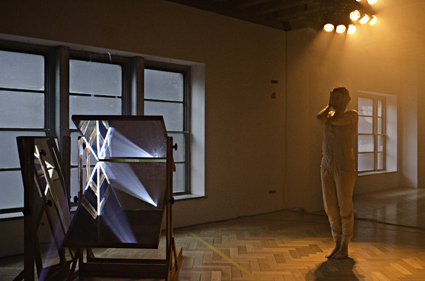metaphors, binaries & mergings
varia karipoff: deanne butterworth, twinships

Deanne Butterworth, Twinships
photo Rohan Young
Deanne Butterworth, Twinships
DEANNE BUTTERWORTH’S TWINSHIPS IS A HYBRID CREATURE THAT MELDS DANCE WITH INSTALLATION, WITH A DOSE OF WELL-CURATED SOUND RECORDINGS FOR GOOD MEASURE. THE INSTALLATION COMPONENT CONSISTS OF COLOURED LINES MARKING OUT THE PARQUET FLOOR. WE COULD BE INSIDE A SPORTS HALL; A CURVED LINE RESEMBLES THE THREE-POINT ARC OF A BASKETBALL COURT.
Three mirrors are joined together in a frame contraption and are set at different angles to reflect projections across two walls, a sliver of a triangle on one wall and a bigger slice of moving image on the back wall. Themes of nature, emotional states and a final video of a streetscape through a window create a mood background for the dance.
When we enter Westspace, a smoke haze fills the room. Amid the sound of cicadas and wind blowing, a large paper scroll is unfurled by assistants. A dancer soon appears behind it. Butterworth’s figure casts shadows across the paper and, as she moves alongside it, she briefly seems to be painting. As in Japanese calligraphic art, her body becomes the honshi, the centrepiece artwork. Bending down and bringing her arms down to the ground, Butterworth’s silhouette becomes an inky mountain. From my angle her feet, which are visible beneath the scroll, are about two inches left of her shadow. While her body is graceful on paper with balletic control, her exposed feet with quivering tendons, show the effort in such grace.
The projections cast on the wall via the mirrors provide mood cues during the performance. While interesting sculpturally, the mirrors themselves have only a subtle effect on the projection and their presence is quickly forgotten. There are five chapters to this dance that the projections help to define by colour. In the second part of the dance, red dominates the projection as Butterworth moves like a boxer, swaying and shifting her weight from foot to foot. Repetition and her stance evoke sports training or a controlled fight. Meanwhile the projected video footage becomes choppy—a red sky with scratching tree branches has a schlocky horror film look. The red gives way to green and a recording of a science lecture plays, signalling a return to rationality and control. Butterworth repeats the same step-by-step movements on the spot, tense arms folding and reaching forward as though she is practicing her moves. She then turns on the spot like a cog. Her arms chop the air like windmills before she dissolves into more fluid movements, also reflected in the projection with a close up of tidal waters.
The lines on the floor work in several ways, first in referencing the moments of sport and practice. Butterworth frequently travels in the direction of the lines across the floor, usually running. The arc provides a path for a repeated series of movements with which she measures out space with her hands before falling backwards. They also create visual interest and act to record the dance in a way, as if she is marking the floor. Butterworth becomes the centrepiece of the dance floor and by extension, the gallery space, as she explores twin themes of nature and science, art and sport.
Twinships, installation & performance; performer, choreographer Deanne Butterworth, sound design Michael Munson, lighting design Rose Connors, set construction Jim Stenson, video Michael Munson, Deanne Butterworth, Westspace, Melbourne, Oct 18-Nov 10
RealTime issue #112 Dec-Jan 2012 pg. 28






